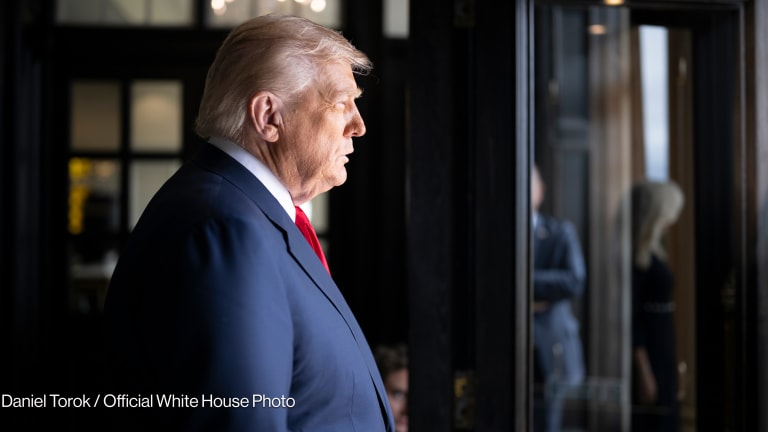What we do and don't know about Trump's US aid plans
Aid experts are looking to the president-elect's early moves for signs of how his administration will handle U.S. global development policy and funding.
In just over a week since he won the election, U.S. President-elect Donald Trump has wasted little time announcing key members of his administration, including top foreign policy posts. For U.S. development agencies and their partners, there are still more questions than answers — decisions about foreign aid rarely rise to the top of the presidential transition to-do list. But U.S. aid experts and advocates in touch with Trump’s transition team are already reading his early moves for signals about what to expect from the incoming administration when it comes to U.S. global development policy and funding. Budget cuts and “efficiency” gains, a narrower foreign aid mandate, supersized anti-abortion policies, a focus on economic growth-led development, greater alignment with national security priorities, and localization all look poised to feature in the next four years, according to experts who spoke at a Devex Pro Live election roundtable this week. “The importance of an economic growth-led foreign assistance strategy is certainly central,” said Porter DeLaney, founding partner of Kyle House Group. “Big change is coming,” said Tom Hart, president and CEO of InterAction. “We can't deny that that's the case, and we need to manage it, and we need to continue to stand firm on our core work, which is the alleviation of human suffering, and preventing global infectious disease, and reducing poverty and increasing stability,” Hart added. For some, the return of Trump’s “America First” agenda to the White House is a wake-up call about the need to make a stronger case for U.S. global health and development leadership to skeptical political leaders — and a skeptical segment of the American public. “We are all taking a moment of reflection here to really figure out: What's the message? What should we be saying to make people understand how relevant this investment is to their day-to-day lives?” said Elisha Dunn-Georgiou, president and CEO of the Global Health Council. But against that broad backdrop, Trump’s foreign aid plans are still a work in progress. Trump, who will take office on Jan. 20, has yet to name the U.S. Agency for International Development’s “landing team” — the group responsible for working with federal agencies to make the transition to new management. According to multiple sources, USAID has designated the agency’s counselor, Clinton White, to coordinate with that team when it arrives — though USAID declined to confirm. Trump has also not yet announced his USAID administrator, though there is no shortage of speculation about whom he might pick to oversee an agency with a roughly $40 billion budget and more than 10,000 employees worldwide. While that person — whoever they turn out to be — awaits confirmation by the U.S. Senate, Trump could designate a career USAID official to serve as acting administrator — as happened last time — or he could choose one of his own to helm USAID until a permanent administrator arrives, said DeLaney. Regardless, the transition process appears to be moving faster than it did after Trump’s first victory in 2016, he added. Cuts and efficiencies At this early stage, two big questions loom large over the future of U.S. foreign assistance. What form will the Trump administration’s “government efficiency” agenda take? And how will that play out for U.S. aid agencies within the federal budget process? “Big change is coming.” --— Tom Hart, president and CEO, InterAction “We don't know yet, and maybe we won't know for a while, what the approach is going to be, but I think those two structural factors will have a huge effect on the policy agenda,” Delaney said. In 2016, it was more than a month before his s transition team began coordinating efforts with USAID, raising fears among some foreign aid advocates that Trump might fold the agency into the Department of State. Trump never proposed such a move, and one source in contact with Trump’s current transition team said there “have not been any serious conversations to date” about doing so this time. Yet it remains to be seen what kind of proposals will emerge from Trump’s appointment of billionaire Elon Musk and entrepreneur-turned-political supporter Vivek Ramaswamy to co-lead a new Department of Government Efficiency — whose acronym, “DOGE,” is a nod to Musk’s favored cryptocurrency. On Wednesday, Ramaswamy wrote on the social media site X that the U.S. government should not fund any programs whose authorizing legislation has expired, a seemingly radical suggestion that would affect both foreign assistance funding and — as many quickly pointed out — billions of dollars for veterans’ health care. Numerous government programs are continued through the appropriations process, rather than through legislative authorizations. That is the result of congressional process breakdowns — not necessarily a reflection on whether Congress thinks those programs should be funded. Regardless of whether any similar ideas come to pass, there is little doubt that the Trump administration will pursue budget and staffing cuts across the federal government — and little reason to think foreign assistance agencies would be spared. “Foreign aid would not be in any way excluded from overall reductions in the size of the federal budget, or reductions in the size of the workforce of the federal government,” DeLaney said. How that budget process plays out is its own guessing game. The government is currently operating under a continuing resolution that expires on Dec. 20 — meaning there has been no budget agreement yet for even the current fiscal year. If negotiations drag on into next year, Trump’s team could look to make its imprint felt more quickly, before putting forward its first forward-looking budget proposal sometime around March, DeLaney said. “What is the administration's approach to the [fiscal year 2025] appropriations endgame? I think that will be a good insight as to what their budget framework is going to be going forward,” DeLaney said. When the Trump administration formulates its foreign aid budget, DeLaney expects the guiding question will be: “How are we rationalizing these investments in the context of foreign policy and national security objectives?” Rules and regulations Some things are more certain. Trump is widely expected to reinstate an even more expansive version of the Mexico City Policy — also known as the global gag rule — which prohibits U.S. funding to organizations abroad that provide abortion services or information. “We expect the Mexico City Policy to be reinstated on day one in a much more expanded way, which will impact not just global health, but humanitarian and development assistance,” said Dunn-Georgiou. Dunn-Georgiou noted that with each successive expansion of funds covered under the policy, the administrative burden for organizations to comply with the rule increases — as does the confusion over what is and is not allowed. “It requires a tremendous amount of education,” she said. It also raises an important question about how the Trump administration will resolve the tension between imposing onerous new regulations at the same time it seeks to pare down agencies’ administrative resources. That same question could arise within the realm of localization. Conservatives have taken up the call to shift more U.S. foreign aid dollars to local organizations — which they see as more efficient and effective alternatives to United Nations agencies and U.S.-based implementers. But it is generally accepted that distributing smaller amounts of money to a larger number of organizations will require USAID to hire more staff, not less. “The Congress and the American taxpayer want some assurance about where things are going to go, and you can't just start pushing money locally without some of those processes. But those processes tend to make things more bureaucratic, and that's one reason why USAID ends up funding large agencies,” said Hart of InterAction.
In just over a week since he won the election, U.S. President-elect Donald Trump has wasted little time announcing key members of his administration, including top foreign policy posts.
For U.S. development agencies and their partners, there are still more questions than answers — decisions about foreign aid rarely rise to the top of the presidential transition to-do list. But U.S. aid experts and advocates in touch with Trump’s transition team are already reading his early moves for signals about what to expect from the incoming administration when it comes to U.S. global development policy and funding.
Budget cuts and “efficiency” gains, a narrower foreign aid mandate, supersized anti-abortion policies, a focus on economic growth-led development, greater alignment with national security priorities, and localization all look poised to feature in the next four years, according to experts who spoke at a Devex Pro Live election roundtable this week.
This story is forDevex Promembers
Unlock this story now with a 15-day free trial of Devex Pro.
With a Devex Pro subscription you'll get access to deeper analysis and exclusive insights from our reporters and analysts.
Start my free trialRequest a group subscription Printing articles to share with others is a breach of our terms and conditions and copyright policy. Please use the sharing options on the left side of the article. Devex Pro members may share up to 10 articles per month using the Pro share tool ( ).
Michael Igoe is a Senior Reporter with Devex, based in Washington, D.C. He covers U.S. foreign aid, global health, climate change, and development finance. Prior to joining Devex, Michael researched water management and climate change adaptation in post-Soviet Central Asia, where he also wrote for EurasiaNet. Michael earned his bachelor's degree from Bowdoin College, where he majored in Russian, and his master’s degree from the University of Montana, where he studied international conservation and development.








